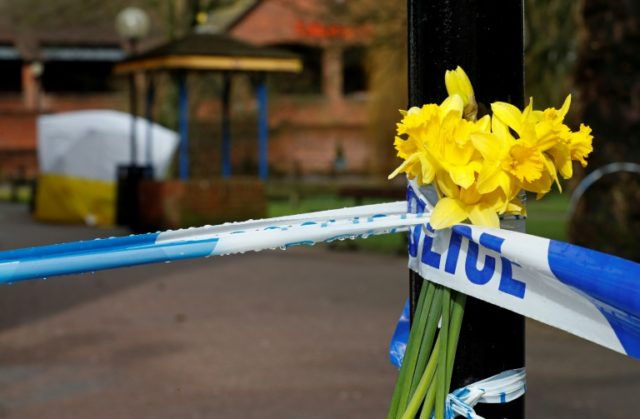London (AFP) – British Prime Minister Theresa May will make a statement Monday on the nerve agent attack against a Russian double agent in an English city, amid speculation she could publicly blame Moscow and announce an “appropriate” response.
May will address the House of Commons after chairing a meeting of the government’s national security council, where she was updated on the investigation into the attack on Sergei Skripal and his daughter Yulia earlier this month.
Senior politicians have pointed the finger at Russia for trying to kill the 66-year-old Russian, who sold secrets to Britain and later moved here in a 2010 spy swap, prompting repeated denials from Moscow.
The prime minister has declined to cast blame while the investigation runs its course, but there is widespread media speculation that she is now set to name Russia and outline how Britain intends to respond.
“If we get to a position when we are able to attribute this attack then we will do so and the government will deliver an appropriate response,” May’s spokesman said on Monday, shortly before her statement was confirmed.
Tom Tugendhat, a lawmaker who chairs the House of Commons foreign affairs committee, told BBC radio: “Frankly, I would be surprised if she did not point the finger at the Kremlin.”
However, Russian President Vladimir Putin’s spokesman Dmitry Peskov once again on Monday denied any involvement.
“The Russian citizen you mention… worked on one of Britain’s special services, the incident took place on British territory, and it is in no way an issue for Russia, let alone for Russian leadership,” he said.
– ‘Wrecking’ UK-Russia relations –
Skripal and his daughter, 33, remain in a critical but stable condition in a hospital after collapsing on a bench in the south-western English city of Salisbury on March 4.
Foreign Secretary Boris Johnson has said the case has “echoes” of the 2006 poisoning by radiation of ex-spy and Kremlin critic Alexander Litvinenko, which London has blamed on Moscow.
That case caused a deep rift in bilateral relations, and the Russian embassy in London on Monday warned the latest case risked “wrecking” ties again.
Posting a photograph of the front page of The Times newspaper suggesting May was set to blame Moscow, the embassy tweeted: “Who in London will be held responsible before the British people for groundlessly wrecking relations with Russia?”
If Russian involvement were confirmed, Britain could expel some diplomats, enact some kind of boycott of the 2018 football World Cup or increase British military presence in Eastern Europe.
Johnson has floated the deepening of sanctions against Russian officials, but this would require international agreement.
Tugendhat warned that any escalation in tensions between London and Moscow could put at risk England fans visiting Russia for the World Cup.
“I’m afraid the danger of Russia responding to British fans for actions taken by their government is all too real,” he said.
– Public urged to clean clothes –
Authorities have yet to confirm the precise nerve agent used, which would give a clue to who was behind the attack that they are treating as attempted murder.
The bench where Skripal was found, his home and a pub and restaurant the pair visited have all been sealed off, as has the grave of Skripal’s wife, Liudmila, who died in 2012.
Health authorities have repeatedly said there is no immediate risk to the public.
However, England’s chief medical officer on Sunday said that up to 500 people who may have come into minimal contact with the nerve agent should wash their clothes and belongings as a precaution.
“We have now learnt that there has been some trace contamination by the nerve agent in both The Mill pub and Zizzi’s restaurant in Salisbury,” Sally Davies said.
She said she was “confident” nobody else at those places was harmed but said there were concerns that prolonged exposure to these substances over the long-term may cause health problems.
The new advice surprised Salisbury residents, even while health authorities insisted the risk to the general public remains low.
“If it’s as serious as what they are saying, then I doubt washing your clothes is going to make a big difference,” Margaret Cowie told the Guardian.

COMMENTS
Please let us know if you're having issues with commenting.